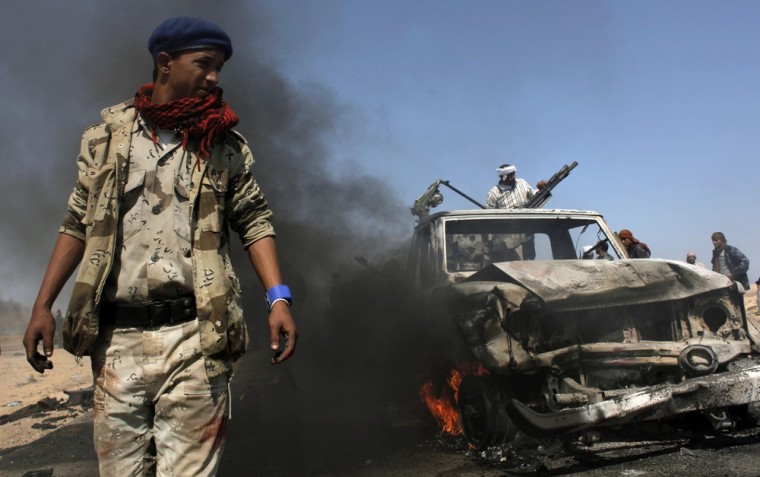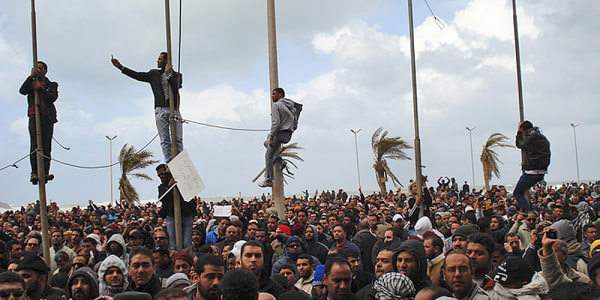Libyan rebels fighting Moammar Gadhafi's forces on Tuesday criticized NATO as too slow to act and said they would ask the U.N. Security Council to suspend its mission unless it "did its job properly."
His comment came after Libyan government forces unleashed a withering bombardment on rebels outside the oil town of Brega and an Obama administration envoy met with the opposition leadership in its de facto capital, a possible step toward diplomatic recognition.
Abdel Fattah Younes, head of the rebel forces, said NATO's inaction was allowing Gadhafi's forces to advance and letting them kill the people of the rebel-held city of Misrata "every day."
NATO took over from a coalition led by the United States, Britain and France on March 31, putting the alliance in charge of air strikes targeting Gadhafi's military infrastructure as well as policing a no-fly zone and an arms embargo.
"The reaction of NATO is very slow. One official calls another and then from the official to the head of NATO and from the head of NATO to the field commander. This takes eight hours," Younes said.
"Either NATO does its work properly or we will ask the Security Council to suspend its work," Younes added during a news conference in Benghazi in the rebel-held east.
"Misrata is being subjected to a full extermination," he said. "NATO blesses us every now and then with a bombardment here and there and is letting the people of Misrata die every day. NATO has disappointed us," he said.
Younes, who defected from Gadhafi's administration to join the rebellion, said the rebels informed NATO whenever they had intelligence that his troops were moving toward a town.
"NATO is moving very slowly, allowing Gadhafi forces to advance," he said. "NATO has become our problem."
He also criticized Turkey for turning back a boat carrying supplies and weapons from Benghazi to Misrata.
NATO said nearly a third of Gadhafi's heavy weapons have been destroyed. But the alliance said Gadhafi's forces had changed tactics in the besieged western city of Misrata by moving tanks and other heavy equipment to civilian areas to prevent pilots from targeting them.
A doctor in Misrata corroborated that, saying Gadhafi's forces have been placing heavy weapons near civilians there for the past two weeks.
"They snuck their anti-aircraft weapons and tanks into the city. They are between the apartment buildings and the trees," said the doctor, who spoke on condition of anonymity for fear of reprisals. "They disguise their equipment on the big agricultural trucks that the farmers use outside of town. They bring in mortars with civilian cars."
The opposition has controlled much of the eastern half of Libya since early on in the uprising that began in February. Misrata is one of two major cities in the west that have also risen up against Gadhafi's regime, which has responded with a brutal crackdown waged over weeks of battles.
The other front is on a coastal road leading out of the rebel stronghold city of Benghazi in the east toward the capital Tripoli in the west. Gadhafi loyalists and opponents have fought a tug-of-war for weeks on the road, with a few main towns and oil ports changing hands repeatedly. Though Gadhafi's forces are stronger, NATO airstrikes have helped the rebels hold back an onslaught on the east.
The regime has softened its public stance against any compromise that would end the fighting and is putting out feelers for a ceasefire, though it continues to resist rebels' demand that Gadhafi step down. Gadhafi's British-educated son Seif al-Islam Gadhafi, on Tuesday, dismissed reports that his father's inner circle of advisers was crumbling following the defection of Foreign Minister Moussa Koussa.
On the coastal road leading from the east to Tripoli, the rebels had managed to take part of the oil town of Brega on Monday, aided by an international air campaign. But the rocket and artillery salvos unleashed on the rebels Tuesday indicated the government's offensive capabilities remain very much intact.
"When you see this, the situation is very bad. We cannot match their weapons," said Kamal Mughrabi, 64, a retired soldier who joined the rebel army. "If the planes don't come back and hit them, we'll have to keep pulling back."
Rebel attempts to fire rockets and mortars against the government forces were met with aggressive counter bombardments that sent many of the rebel forces scrambling back all the way to the town of Ajdabiya, dozens of miles away. There did not appear to be any immediate response from the international aircraft patrolling the skies that have aided the rebels in the past.
Earlier in the day, however, there was an airstrike against a convoy of eight government vehicles advancing toward rebel positions, rebel officer Abdel-Basset Abibi said, citing surveillance teams.
Brig. Gen. Mark Van Uhm of NATO said Tuesday its U.N.-authorized aerial onslaught to stop Gadhafi from attacking dissenters has so far destroyed 30 percent of the Gadhafi's weapons. On Monday alone, the alliance said it carried out 14 attacks on ground targets across the country, destroying radars, munitions dumps, armored vehicles and a rocket launcher.
Three-quarters of Monday's scheduled strike missions, however, had to return without dropping their bombs or launching their missiles because of Gadhafi loyalists made it more difficult for pilots to distinguish between civilians and regime troops, Van Uhm said.
Rebel forces have been helped by the arrival on the front of more trained soldiers and heavier weapons, but they are still struggling to match the more experienced and better equipped government troops, even with the aid of airstrikes.
Slideshow 81 photos
Libya's uprising against Gadhafi
President Barack Obama's envoy to the opposition, Chris Stevens, was meeting with members of Libya's Transitional National Council in Benghazi to get a better idea of who they are, what they want and what their needs and capabilities are, a U.S. official said. His visit could pave the way for U.S. recognition of the council as Libya's legitimate government although no decision is imminent, the official said.
Stevens was the No. 2 at the U.S. embassy in Tripoli until the mission was shuttered in February amid escalating violence. He will be discussing humanitarian and possible financial assistance to the opposition, the official said. The official spoke on condition of anonymity pending an announcement of the visit by the White House on Tuesday.
Three countries, including NATO allies France and Italy, along with Qatar, have recognized the transitional council as the legitimate representatives of the Libyan people but the United States has yet to follow suit. The U.S. has also not made a decision on whether to arm the rebels.
The head of the African Union, meanwhile, voiced his support for Gadhafi, calling for the end to foreign interference into what he called an internal Libyan problem.
Teodoro Obiang Nguema, 69-year-old president of Equatorial Guinea, described Western military efforts to enforce a no-fly zone over Libya as a "so-called humanitarian intervention."
This report includes information from Reuters and The Associated Press.

